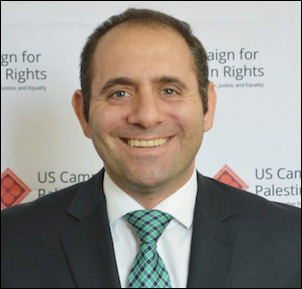by Matthew Mainen
Responsible actors who care about peace in the Middle East will not entertain this fairytale for even a minute. Lebanon is a good starting point as to why.

Fanciful imaginings aside, a one-state solution would be catastrophic for Israelis and Palestinians alike.
|
As the name implies, the one-state solution centers on creating a harmonious binational state, with an almost certain Palestinian majority, between the Mediterranean Sea and Jordan River. It is supported by prominent Palestinian-Americans like Women's March co-founder Linda Sarsour and Electronic Intifada head Ali Abunimah. Just as things were about to burst in Lebanon, Yousef Munayyer, executive director of the US Campaign for Palestinian Rights, expanded on his vision of the idea in an article titled, "There Will Be A One-State Solution," published in the November/December issue of Foreign Affairs.

Yousef Munayyer
|
Since its creation, Lebanon has teetered on the brink of collapse. For 15 years, ethnic tensions fueled a bloody civil war as different branches of Islam, Islamic off-shoots, and Christianity vied for power. The convoluted power-sharing arrangement that ultimately ended the war, the Taif Agreement, has failed to turn Lebanon into a thriving society. As noted by The Economist, Lebanon has one of the largest debt-to-GDP ratios in the world. Sectarian strife keeps Lebanon mired in gridlock, which results in the kinds of inefficiencies driving the current protests. When painful compromises are made, such as giving the Shia Hezbollah terror organization effective veto power, they often prove fruitless.
Lebanon and Iraq exemplify the pitfalls of forging a multi-ethnic democracy in the Middle East.
|
While the cases of Lebanon and Iraq are highly illuminating, looking at the history of Israel and the Disputed Territories alone may suffice. From the end of World War I until Israel's independence in 1948, Jews and Arabs lived together under the single administration in the British Mandate of Palestine. It was a catastrophe.
Jews and Arabs lived together under a single administration in Mandatory Palestine for 28 years.
|
And a power struggle it will be. One-staters envision shared governance between Jews and Arabs, who will work together under a liberal democratic framework, but the Palestinians have proven unable to do this even amongst themselves. Two years after Israel withdrew from Gaza, Hamas overthrew the PLO and instituted a totalitarian Islamist regime.

Mandatory Palestine exhibited many of the same problems that later bedeviled Lebanon and Iraq. Above, the Jaffa Riots of 1921.
|
The same goes for the "liberal" part of "liberal democracy." Polls by the nonpartisan Pew Research Center show that the Palestinians hold beliefs vehemently at odds with an inclusive society. A majority support honor killings, and 93% of the population harbors antisemitic views, according to the Anti-Defamation League.
Before the one-state solution as envisioned by Palestinian advocates is even discussed, Palestinians have a very long way to go. Looking at examples from the broader region, there's good reason to believe that an Israeli-Palestinian utopia will forever remain a pipe dream.
Understandably, as US President Donald Trump continues to delay his vision for resolving the conflict, ideas counter to the mainstream two-state solution will be discussed. Some are worse than others, but few are as bad as the one-state solution.
Matthew Mainen is a Washington-resident fellow at the Middle East Forum and graduate of Stanford Law School. Follow him on Twitter.
Source: https://www.meforum.org/59838/the-delusional-one-state-solution
Follow Middle East and Terrorism on Twitter
No comments:
Post a Comment